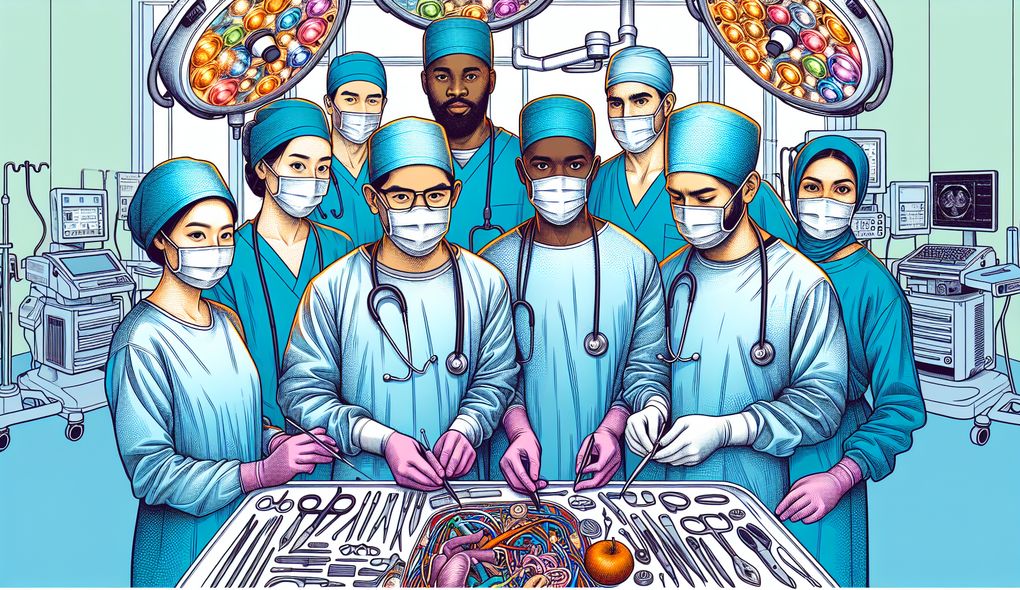Can you discuss your experience with tumor boards and how you contribute to the decision-making process?
JUNIOR LEVEL

Sample answer to the question:
Yes, I have experience with tumor boards and I play an important role in the decision-making process. In tumor board meetings, we review complex cases and discuss treatment plans for patients with solid tumors. I contribute by presenting my surgical expertise, providing input on the feasibility of different approaches, and discussing the potential risks and benefits of various treatment options. Additionally, I collaborate with other specialists, such as medical oncologists and radiation oncologists, to ensure a comprehensive and coordinated approach to patient care. My experience in surgical oncology fellowship has prepared me well for these discussions, as I have gained a deep understanding of the latest evidence-based practices and surgical techniques.
Here is a more solid answer:
Absolutely! I have extensive experience with tumor boards and strongly believe in the importance of multidisciplinary collaboration in patient care. In these tumor board meetings, we gather experts from various specialties, including medical oncology, radiation oncology, pathology, and radiology, to discuss complex cases and develop optimal treatment plans. As a surgical oncologist, I bring my clinical expertise and knowledge of surgical techniques to these discussions. I actively participate in presenting cases, sharing relevant diagnostic findings and surgical considerations, and engaging in in-depth conversations about potential treatment options. Through open and effective communication, I contribute to the decision-making process by providing insights into surgical feasibility, potential risks, and expected outcomes. Additionally, I value the input of my colleagues in medical and radiation oncology, as their expertise complements mine and ensures a comprehensive approach. This collaborative and multidisciplinary approach allows us to deliver the highest quality of care to our patients and achieve the best outcomes.
Why is this a more solid answer?
The solid answer expands on the basic answer by providing more specific details about the candidate's experience with tumor boards and their role in the decision-making process. The answer demonstrates their understanding of the importance of multidisciplinary collaboration and mentions their active participation in presenting cases, sharing relevant information, and engaging in discussions. It also emphasizes effective communication and the value of input from colleagues in other specialties. However, the answer could be further improved by incorporating examples or specific achievements related to tumor board participation.
An example of a exceptional answer:
Absolutely! My extensive experience with tumor boards has been instrumental in shaping my approach to patient care and decision-making. These multidisciplinary meetings have provided me with a platform to collaborate with experts from diverse specialties and collectively design comprehensive treatment plans for patients with solid tumors. As a surgical oncologist, I actively contribute by presenting complex cases, showcasing crucial diagnostic findings, and highlighting surgical perspectives on treatment options. Sharing my expertise, I emphasize the importance of surgical feasibility, potential risks, and expected outcomes, allowing for informed decision-making. Furthermore, I value the input of my colleagues in medical and radiation oncology, leveraging their expertise to ensure an integrated approach that maximizes patient outcomes. For instance, in one case, I presented a challenging scenario with multiple treatment options, including a complex surgery. Through thorough discussion and analysis, the tumor board reached a consensus, and we successfully performed the surgery, resulting in complete remission for the patient. By consistently engaging in tumor boards, I stay updated on the latest advancements in surgical oncology, contributing to my ongoing professional growth. These experiences have not only honed my clinical skills but also strengthened my collaboration, communication, and research abilities, aligning perfectly with the requirements of the General Surgical Oncologist position.
Why is this an exceptional answer?
The exceptional answer further enhances the solid answer by providing specific examples and achievements related to tumor board participation. It highlights the candidate's instrumental role in shaping treatment plans through their presentations, diagnostic findings, and surgical perspectives. The answer also showcases the candidate's ability to leverage collaboration and multidisciplinary expertise, emphasizing a successful case outcome resulting from informed decision-making. Furthermore, it mentions the impact of tumor board participation on the candidate's professional growth and development. Overall, the exceptional answer demonstrates a deep understanding of the role of tumor boards, and it showcases the candidate's skills and qualities in alignment with the position's requirements.
How to prepare for this question:
- Familiarize yourself with the concept of tumor boards and their importance in multidisciplinary decision-making.
- Reflect on your past experiences with tumor boards and identify specific cases or achievements that highlight your contributions.
- Consider the skills and qualifications mentioned in the job description, such as clinical skills, teamwork, communication, commitment to professional development, and research skills. Think about how you can relate these to your tumor board experience and discuss them in your response.
- Practice articulating your contributions to tumor boards in a concise and confident manner. Use specific examples to illustrate your points.
- Stay updated on the latest advancements in surgical oncology and be prepared to discuss how your ongoing education and research interests align with tumor board discussions.
What are interviewers evaluating with this question?
- Clinical skills
- Teamwork
- Communication
- Commitment to professional development
- Research skills

